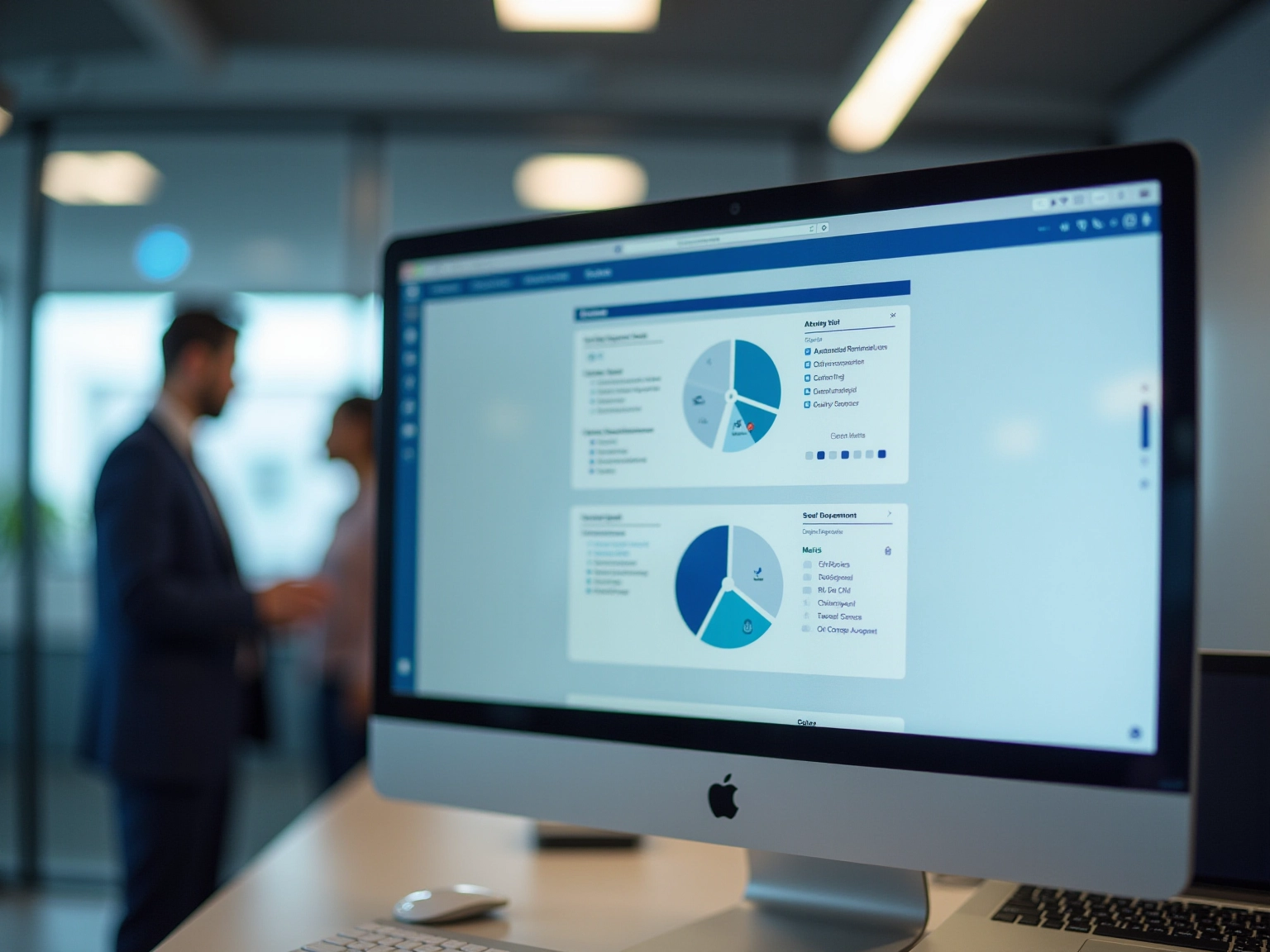Overview
Portal software in accounting significantly enhances efficiency and client engagement by facilitating secure communication and streamlined document sharing, thereby reducing reliance on traditional email. This technology addresses the prevalent challenges faced by accounting managers today. Features such as automated reminders and real-time reporting not only improve response rates but also lead to substantial time savings. Firms have reported saving up to 288 hours during tax seasons through the effective implementation of such technology. By adopting these advancements, accounting professionals can transform their operational efficiency and client interactions, ultimately driving success.
Key Highlights:
- Portal software facilitates secure communication and document sharing between accountants and clients, enhancing workflow efficiency.
- Utilizing portal applications reduces reliance on email, minimizing missed messages and delays.
- Features like automated reminders and real-time reporting improve communication efficiency and customer engagement.
- 80% of finance executives believe that AI and automation provide a competitive edge, with 79% noting enhanced productivity.
- The financial software market is projected to reach $11.8 billion in the next eight years, indicating its growing significance.
- Case studies reveal significant time savings, with firms reporting up to 288 hours saved during tax seasons using portal software.
- Common communication challenges in accounting include lost emails and delayed responses, which portal software helps to resolve.
- Effective portal software should include secure document management, user-friendly interfaces, and integration capabilities.
- The implementation of portal software leads to a 40% increase in customer response rates and a 50% reduction in response times.
- Security and compliance are critical, with portal solutions needing to adhere to regulations like GDPR to protect sensitive data.
- Best practices for implementing portal software include needs assessments, stakeholder involvement, and ongoing support.
Introduction
In the rapidly evolving landscape of accounting, the integration of portal software stands out as a transformative solution for enhancing communication and operational efficiency. These secure online platforms not only facilitate seamless document sharing between accountants and clients but also streamline workflows, enabling real-time interactions that are crucial in today’s fast-paced environment.
As firms increasingly move away from traditional communication methods, the advantages of utilizing technology like Glasscubes become evident—significant time savings, improved client engagement, and enhanced data security.
With the accounting industry projected to undergo substantial changes in the coming years, understanding the pivotal role of portal software is essential for firms aiming to remain competitive and responsive to client needs.
Understanding Portal Software in Accounting
Portal applications in finance serve as secure online platforms that facilitate seamless communication and document sharing between accountants and their clients. These portals significantly streamline workflows, enabling users to upload documents, track requests, and engage in real time communication. This technology proves particularly advantageous in the finance sector, where timely access to information is critical for compliance and informed decision-making.
By utilising portal software, firms can reduce their reliance on traditional email communication, which frequently leads to missed messages, delayed responses, and duplicated requests. With features such as automated reminders that prompt users for responses and real time progress tracking, Glasscubes enhances communication efficiency while ensuring that all interactions are secure, encrypted, and GDPR compliant. Recent statistics reveal that 80% of finance executives believe that leveraging AI and automation through such platforms can provide a competitive edge, while 79% assert that it enhances overall productivity.
Moreover, the global market for financial software is projected to reach $11.8 billion within the next eight years, underscoring the growing importance of these tools in the sector.
The implementation of portal software not only boosts operational efficiency but also elevates customer satisfaction by providing a centralised hub for all interactions and document exchanges. Accounting professionals emphasise that dedicated onboarding assistance is vital for improving client information gathering and engagement, ensuring that both accountants and clients can navigate the platform effectively. This aspect is particularly crucial, as companies that have adopted Glasscubes report saving an impressive 288 hours in a single tax season, highlighting the substantial time savings associated with effective portal software.
Case studies illustrate the necessity for automation in modern accounting practices. For instance, organisations utilising Glasscubes report remarkable time savings, with one user noting an astounding 288 hours saved in a single tax season. This efficiency translates to a 40% increase in customer response rates and a 50% reduction in response times, showcasing the tangible benefits of adopting such technology.
As we approach 2025, emerging trends indicate a shift towards more advanced portal solutions that incorporate assisted intelligence, allowing machines to handle repetitive tasks while human oversight remains essential. This collaborative approach not only optimises workflows but also enhances the overall customer experience, making portal applications indispensable resources for accounting firms aiming to improve communication and engagement with clients. Furthermore, as Onpay highlights, 49% of small business owners regard suggestions from professional advisors as the most crucial resource when selecting an accountant, further emphasising the need for effective communication with customers facilitated by portal software.
Common Challenges in Accounting Communication
Accounting firms frequently grapple with communication challenges, including delayed responses, lost emails, and difficulties in tracking document submissions. These obstacles lead to inefficiencies, increased workloads, and ultimately, customer dissatisfaction. Accountants often find themselves dedicating substantial time to resolving missing documents or clarifying customer inquiries, detracting from their primary responsibilities.
Research shows that managers significantly influence employee engagement, accounting for 70% of the variance in this area. This highlights the critical role effective communication plays in enhancing productivity and trust within teams.
Prior to implementing Glasscubes, many firms encountered considerable difficulties in managing customer information requests. They relied on cumbersome email threads and Excel documents, which frequently resulted in lost information and duplicated requests from various team members. As one user remarked, “We had long email trails, and information would get lost, making it hard to keep track of what we had and what we still needed.”
This disorganisation made it challenging to maintain a clear overview of received information versus outstanding requests.
The lack of a centralised communication platform can intensify these issues, leading to fragmented information and complicating the maintenance of accurate records. Portal software like Glasscubes effectively addresses these challenges by creating a structured environment that consolidates all communications and documents in one location. Users report that Glasscubes not only streamlines the audit process but also enhances engagement by allowing customers to see what information they still need to provide, significantly reducing the necessity for repeated follow-ups.
This integration substantially decreases the time accountants spend on follow-ups, enabling them to focus on delivering value to their clients.
The dedicated onboarding support provided by Glasscubes assists accounting firms in improving their information collection and engagement, further enhancing the platform’s efficiency. Case studies illustrate the impact of such solutions: organisations utilising Glasscubes have reported an impressive 40% increase in customer response rates and a 50% reduction in response times. Notably, users like Sophie Montgomery from TaxAssist Accountants have reported saving an astounding 288 hours during just one tax season.
This not only optimises workflows but also boosts customer satisfaction, as evidenced by testimonials from users who have saved hundreds of hours during peak tax seasons. By leveraging portal software like Glasscubes, financial firms can effectively overcome common communication obstacles, leading to enhanced efficiency and stronger relationships with customers.
Key Features of Effective Portal Software
Effective portal software for accounting must encompass several essential features that significantly enhance efficiency and client engagement.
-
Automated Reminders: Glasscubes’ automated reminder feature is essential in ensuring timely document submissions from customers, effectively minimising the need for manual follow-ups. The basic option permits companies to send up to 10 reminders on a simple schedule, while advanced options enable unlimited reminders with customisable frequencies and messages designed to indicate urgency for upcoming deadlines. By automating this process, firms can experience a notable increase in customer response rates, with some users reporting up to a 40% improvement. As Roman Villard, CEO of Full Send Finance, aptly noted, “Automating communication friction in areas like customer requests and reminders can yield a far greater impact than most realise!”
-
Real-Time Reporting: Glasscubes offers real-time reporting features that enable accountants to track the status of customer requests and submissions continuously. Real-time visibility into ongoing processes not only streamlines workflow but also enhances accountability, allowing firms to respond promptly to any issues that may arise. Firms using Glasscubes have reported a 50% reduction in response times, demonstrating the effectiveness of this feature.
-
Secure Document Management: A reliable portal software like Glasscubes must provide secure storage and sharing features to protect sensitive customer information. With 99% of companies preparing for stricter disclosure requirements, ensuring data security is vital in maintaining customer trust and compliance with regulatory standards.
-
User-Friendly Interface: The application should be intuitive, requiring minimal training for both accountants and clients. A user-friendly design fosters greater adoption and satisfaction, as evidenced by testimonials from users who appreciate the ease of navigation without extensive onboarding.
-
Integration Capabilities: Glasscubes’ ability to seamlessly integrate with existing financial software is vital for enhancing workflow efficiency. This feature allows for smooth data transfer and management, reducing the friction often associated with disparate systems.
These features collectively contribute to a more organised and efficient financial practice through the use of portal software. Additionally, 88% of organisations cite business process improvement as the primary motivation for adopting automation. By utilising these capabilities, accounting firms can not only enhance their operational efficiency but also boost customer engagement, ultimately resulting in increased satisfaction and loyalty.
Significantly, users such as Sophie Montgomery from TaxAssist Accountants indicated saving 288 hours in a single tax season, demonstrating the considerable time reductions that can be accomplished through efficient portal tools.

Enhancing Client Engagement Through Portal Software
Portal applications are essential for enhancing customer engagement by offering a streamlined platform for direct communication and interaction. Clients can easily upload documents, ask questions, and receive prompt responses from their accountants, cultivating a collaborative atmosphere. This immediate access to information not only boosts transparency but also builds trust—an indispensable element in accountant relationships.
Key features such as user dashboards empower individuals to track the status of their requests and stay informed about critical deadlines, significantly elevating their engagement levels. By optimising communication and enhancing accessibility, financial organisations can create a more interactive environment with portal software. This approach has been proven to lead to greater customer satisfaction and retention rates, with companies utilising such technology experiencing a remarkable 40% increase in customer response rates and a 50% reduction in response times, as evidenced by organisations like Menzies.
Moreover, the importance of transparency in these relationships cannot be overstated; it is a vital component that enhances customer trust and satisfaction. As accounting firms increasingly adopt portal solutions like Glasscubes, they are not only improving their operational efficiency but also ensuring that customers feel valued and engaged in the process, ultimately driving superior outcomes for both parties. For example, Sophie Montgomery from TaxAssist Accountants reported an astounding 288 hours saved in just one tax season, underscoring the significant time savings achieved through the use of portal software.
As companies leverage features such as automated reminders and real-time reporting, they further enhance customer engagement and satisfaction. Discover how Glasscubes transforms client engagements in just 4 minutes! Watch our on-demand demo to see how we streamline information gathering and save hundreds of hours of effort.
Prefer a tailored experience? Click here to schedule a personalised demo with one of our Product Specialists.
Ensuring Security and Compliance with Portal Solutions
In the accounting industry, where sensitive financial data is routinely handled, security and compliance stand as paramount concerns. Portal software must adhere to stringent security protocols, including robust data encryption, secure access controls, and regular security audits. Adhering to regulations like GDPR is not merely a legal obligation but a critical step in safeguarding customer information and diminishing the risk of costly breaches.
Consider this: the average total cost of the most disruptive data breach reported by organisations reached £1,205, with micro and small businesses facing even steeper immediate costs.
Effective portal solutions incorporate features such as audit trails, which meticulously track user activity and document access, thereby ensuring accountability and transparency. This is particularly crucial given that the average company shares confidential information with 583 third-party vendors, heightening the risk of data exposure. By utilising secure portal applications, financial organisations can protect user information and uphold adherence to industry standards, thereby enhancing their reputation and fostering trust.
Moreover, the rise of social engineering attacks, including ransomware incidents that averaged $5.13 million in 2023, underscores the necessity for robust security measures. Organisations that engaged law enforcement during breaches saved nearly $1 million on average, highlighting the financial benefits of proactive security strategies. Consequently, investing in secure portal software is vital for financial organisations aiming to safeguard their customers and optimise operations efficiently.
In addition to security, Glasscubes offers an automated reminder feature that significantly enhances customer engagement. The basic option allows financial companies to send up to 10 reminders on a straightforward schedule, while advanced options enable sending an unlimited number of reminders with any frequency or on specific days of the year. Firms can also customise the messages for each reminder, ensuring timely communication and efficient information gathering.
This flexibility keeps clients informed about important deadlines and updates, thus improving overall client satisfaction. Furthermore, the seamless onboarding experience provided by Glasscubes, which requires no training and includes tailored setup support, ensures that financial organisations can swiftly adapt to the platform while maintaining a focus on security and compliance. As noted by a Director of Operations at a Medium Income Charity, “It’s on their radar and they’re astute. They agree with what we suggest most of the time,” emphasizing the critical importance of having reliable security measures in place.

Best Practices for Implementing Portal Software
To effectively utilise portal applications, accounting companies should adhere to the following best practices:
- Conduct a Needs Assessment: Begin by identifying the specific requirements and challenges within the organisation. This step ensures that the chosen application aligns with the firm’s operational needs and addresses any existing inefficiencies, particularly in managing personal tax and payroll information.
- Involve Stakeholders: Engaging team members and customers in the software selection process is crucial. Collecting feedback from these stakeholders not only promotes a sense of ownership but also increases the chances of successful adoption, particularly when moving to a solution like Glasscubes that simplifies engagement with customers.
- Provide Comprehensive Training: Offering thorough training sessions for both staff and clients is essential. This method acquaints users with the new system, greatly diminishing resistance to change and encouraging confidence in using the application efficiently, which is crucial for optimising the advantages of Glasscubes’ features.
- Monitor and Evaluate Performance: After implementation, it is essential to continuously observe the system’s performance. Gathering user input enables companies to pinpoint areas for enhancement and implement essential modifications, ensuring the application stays efficient and pertinent in boosting customer satisfaction and decreasing information processing times.
- Ensure Ongoing Support: Establishing a robust support system for users is critical. This assistance should resolve any concerns or inquiries that come up post-implementation, aiding in the preservation of user satisfaction and involvement, especially as companies adjust to new workflows with Glasscubes.
By adhering to these best practices, organisations can ensure a seamless transition to portal software, ultimately improving efficiency and client involvement. As companies in the UK produce 400 billion invoices each year, the significance of effective document management in financial organisations cannot be overstated. Moreover, as ACCA observes, over 50% of finance executives anticipate that the advancement of automated and intelligent financial systems will greatly influence finance firms over the next 30 years.
This emphasises the necessity for businesses to utilise software that serves as a portal, such as Glasscubes.
A practical illustration is offered by Content Snare, which simplifies document collection from customers by centralising uploads and minimising unanswered emails. By utilising such solutions, including Glasscubes, financial organisations can enhance their efficiency in collecting customer documents, thereby improving service delivery and customer satisfaction. As the financial landscape changes, companies that emphasise flexibility and adaptability will be better equipped to handle future developments and enhance their operational efficiency.

Case Studies: Success Stories from Accounting Firms
The deployment of portal software stands as a transformative factor for accounting businesses, significantly enhancing both efficiency and customer interaction. TaxAssist Accountants, for example, reported an impressive saving of 288 hours during a single tax season by leveraging Glasscubes, a portal solution that streamlined their communication processes. This efficiency improvement is not an isolated case; another company noted a remarkable 40% rise in customer response rates and a 50% decrease in response times following the implementation of Glasscubes, which enabled quicker document submissions and enhanced engagement with customers.
Steve, an audit manager at MGI, articulated how Glasscubes revolutionised their audit process. Prior to adopting Glasscubes, the firm grappled with lengthy email trails and lost information. However, with Glasscubes, they experienced faster replies from customers and appreciated the clarity of having all information consolidated within a secure workspace.
Clients could effortlessly log in to view outstanding queries, which not only improved their engagement but also expedited the information-gathering process. These success narratives underscore the potential of portal software to transform financial practices by alleviating administrative burdens and fostering stronger customer relationships. Furthermore, the dedicated onboarding support provided by Glasscubes assists accounting businesses in enhancing information collection and engagement, thereby further boosting the overall efficiency of the software.
By embracing such technologies, companies can enhance their operational efficiency while establishing a more responsive and engaging client experience. The insights drawn from these examples can serve as a valuable guide for firms considering the integration of Glasscubes into their workflows.

The Future of Accounting with Portal Software
The future of financial management is being profoundly shaped by technological innovations, notably through portal software like Glasscubes, which significantly enhances communication and operational efficiency. As companies increasingly embrace digital solutions, reliance on traditional methods is expected to wane, leading to streamlined and more effective operations. Cutting-edge technologies, such as cloud computing—offering immediate access to resources—and automated financial tasks that prioritise analytical work over routine activities, are set to revolutionise the efficiency of portal software, enabling even greater improvements in workflows and customer interactions.
By integrating advanced features like automated reminders, real-time reporting, and secure file sharing, financial services can enhance their operational efficiency while fostering improved customer satisfaction and loyalty. For example, firms utilising Glasscubes have experienced a remarkable 50% reduction in client response times and a 38% increase in response rates, illustrating the tangible advantages of adopting such innovative tools.
Moreover, expert insights suggest that the financial sector is on the brink of a significant transformation, with thought leaders underscoring the necessity of adapting to these changes. As Steve Chase, Vice Chair of AI and Innovation for KPMG, notes, “We believe that professional services is experiencing the most significant transformation it will probably ever undergo,” highlighting the crucial role of advancements in portal technology.
The evolution of portal software signifies a vital leap towards a more innovative and responsive financial sector. As companies embrace these technologies, they position themselves at the forefront of the future of finance, ready to meet the demands of an increasingly digital landscape. Additionally, advanced data presentation techniques through these portals enhance communication, catering to diverse learning styles and improving decision-making within organisations.
Glasscubes also offers a user-friendly onboarding process and time-saving automation features, ensuring that companies can swiftly adapt to these tools and fully leverage their benefits. Furthermore, with pricing options that encompass various support packages, Glasscubes delivers a comprehensive solution tailored to the specific needs of accounting firms.
Conclusion
The integration of portal software like Glasscubes in accounting is revolutionising how firms communicate and operate, paving the way for enhanced efficiency and client engagement. By utilising these secure online platforms, accountants can streamline workflows, facilitate real-time interactions, and significantly reduce administrative burdens. The case studies presented illustrate the tangible benefits, such as the impressive 288 hours saved during tax seasons and a 40% increase in client response rates, underscoring the critical role of technology in modern accounting practices.
As the industry continues to evolve, embracing portal software is no longer just an option but a necessity for firms aiming to stay competitive. The ability to automate reminders, provide real-time reporting, and ensure secure document management not only improves operational efficiency but also enhances client trust and satisfaction. Additionally, the focus on user-friendly interfaces and comprehensive onboarding support ensures that both accountants and clients can fully leverage these tools without extensive training.
Looking ahead, the future of accounting will be increasingly shaped by technological advancements. Firms that adopt these innovative solutions will be better positioned to meet the demands of a digital landscape. As the transition from traditional methods accelerates, the importance of effective communication and client engagement through portal software will continue to be a key driver of success in the accounting industry. Embracing these changes not only fosters stronger client relationships but also prepares firms for the challenges and opportunities that lie ahead.
